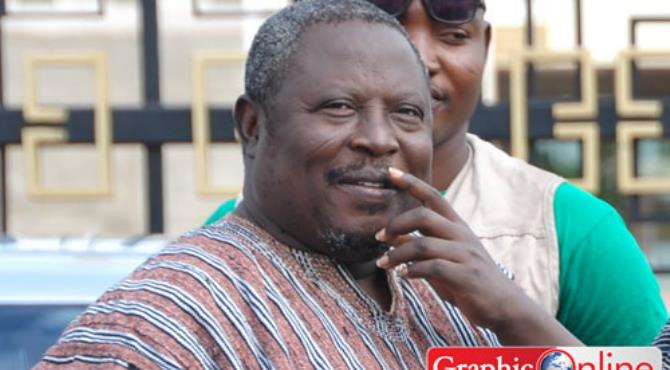
Amidu asks EC boss to resign
A former attorney General and Minister of Justice, Mr Martin Amidu, has waded into the disqualification saga of some presidential aspirants and described the move by the Electoral Commission (EC) as a show of “abuse of power and abject arrogance.”
According to Mr Amidu, the Chairperson of the EC, Mrs Charlotte Osei, should resign for abusing her powers and not following due process in disqualifying 12 presidential aspirants.
In an article coming on the heels of the Accra High Court’s ruling last Friday, which ordered the EC to allow the flag bearer of the Progressive People’s Party (PPP), Dr Papa Kwesi Nduom, the opportunity to correct errors on his nomination form, Mr Amidu argued that the EC chairperson must be held responsible for the errors made by the presidential aspirants, since she failed to adequately educate them on how to fill the nomination forms.
Nduom’s case
The EC disqualified 12 aspirants and put their nomination on hold pending a court ruling.
Dr Nduom of the PPP, after failing to convince the EC to allow him to correct the errors on his nomination forms, sued the EC and the court ordered the EC to provide an opportunity for the presidential aspirant to correct errors on his forms so he could be part of the December 7 polls.
Nana Konadu Agyeman-Rawlings of the National Democratic Party (NDP), Mr Hassan Ayariga of All People’s Congress (APC) and Dr Edward Mahama of the People’s National Convention (PNC) have all sued the EC. Their various cases are still pending.
Wrong application of C.I. 94
According to Mr Amidu, the court ruling on Dr Nduom’s case did not come as a surprise to him because the EC failed to properly apply the provisions of C.I 94, resulting in the ‘illegal’ disqualification of the aspirants.
He said a casual reading of the reasons provided by the chairperson in disqualifying the aspirants would lead one to conclude that the decision was premised on an alleged non-compliance with the regulations in C.I. 94 and made one walk away with the cogent and credible impression that the chaiperson purportedly acted in pursuance of an alleged power of disqualification vested in her.
“But a fleeting perusal of regulation 9 of C.I. 94 should have left any lazy reader with a firm conviction that the chairperson had no legal authority to invalidate the nomination of an aspiring candidate for president without first giving the candidate the opportunity to alter or amend his or her improperly completed nomination forms.
Commonsense objections
According to Mr Amidu, the commonsense objections of the various aspiring candidates to their disqualification in violation of regulation 9(2) of C.I. 94 were, however, met with “insolent language bordering on insults and impunity demonstrating the perceived omnipotence and infallibility of the chairperson in making her decisions”.
“Truth be told, I have never in my long years of experience in the public service witnessed the degree of arrogance and impunity exhibited towards the respectable aspiring presidential candidates who sought to reason with the chairperson to simply comply with the duties imposed upon her by the Constitution and the laws governing the process. Without waiting for the aspiring candidates to exhaust their constitutional rights to challenge her arbitrary decisions and determinations, she arrogantly proceeded to refer the aspiring candidates to the police for investigation for the commission of various offences alleged by her in her statement of reasons for disqualifying them. This was clearly a scheme she designed to intimidate the aspiring candidates and frighten them with the police powers of the executive from vindicating their rights before the courts. It should be everybody’s guess how she managed to recruit the Ghana Police Service which is currently under the control and direction of the partisan NDC government to foster her agenda of harassing and intimidating these innocent citizens into accepting her unlawful decisions of disqualifying them,” Mr Amidu said.
Impunity
He said it was amazing that the chairperson failed or refused to realise that her impunity in not complying with the Constitution and the law in disqualifying the aspiring candidates disclosed more about her failure as the head of the Electoral Commission than the ignorance or lack of attention on the part of the aspirants in filling the complex nomination forms designed by her office for the presidential elections.
“The decision of Mr Justice Eric Kyei Baffour of the Commercial Division of the High Court, Accra, in the case of the Republic v Charlotte Osei and the Electoral Commission, Ex Parte Nduom, 28th October, 2016, will forever remain a testimony to the resilience of Ghanaian jurisprudence to curb impunity, arbitrariness, abuse of power and abject arrogance on the part of public officials under the 1992 Constitution,” Mr Amidu wrote.
He contended that “instead of rushing to disqualify them [the aspirants] contrary to the due process of law (particularly the right to alter or amend as provided by law and natural justice) and gloating on her competence in the unlawful application of C.I. 94, she [Charlotte Osei] should have resigned for failing in her functions to educate the aspirants on the complex nomination electoral process and its purpose”.
Mr Amidu added that the development was a demonstrable failure and an indictment on the competence of the Electoral Commissioner that only four of her class of 17 political parties and independent aspiring presidential candidates were able to understand and complete the nomination forms without error and to submit them at her own appointed time of September 29 and 30, 2016.
